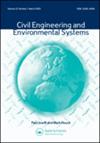使用遗传算法和多准则决策分析的下水道远程控制系统的运行时优化:CSO和能耗降低
IF 1.1
3区 工程技术
Q3 ENGINEERING, CIVIL
引用次数: 3
摘要
摘要:提出了一种利用远程控制系统在强烈气象事件下进行下水道调节的新方法。以某污水处理厂上游集水系统的溢水和电能消耗最小化为目标,开发了一种运行时多目标决策方法,并将其应用于实例研究。策略优化利用遗传算法和短期预测水流进入下水道系统。即使延迟短至30秒,也能有效优化系统可控参数,保证了灵活性、对不断变化的条件的快速适应和可靠性。与传统方法相比,采用建议的运行时优化方案可节省高达32%的能源,而其代价是增加大约30%的总合流污水溢出量。10%。对于基本的系统布局,为大多数强降雨事件安装一个额外的缓冲水箱可以保证减少7%的水流出,减少36%的能源消耗。对不同布局进行的敏感性分析显示,没有证据表明对超过90分钟的水量预测更倾向于时间范围。本文章由计算机程序翻译,如有差异,请以英文原文为准。
Run-time optimisation of sewer remote control systems using genetic algorithms and multi-criteria decision analysis: CSO and energy consumption reduction
ABSTRACT A new approach for sewer regulation with remote-control systems in case of intense meteorological events is presented. A run-time multi-objective decision method was developed and applied to a case study with the aim of minimising water overflow and electric energy consumption of the upstream water collection system of a wastewater treatment plant. Strategy optimisation makes use of genetic algorithms and short-time predictions of water flows into the sewer system. The ability to efficiently optimise the system controllable parameters even for lags as short as 30 guarantees flexibility, prompt adaptation to changing conditions and reliability. With respect to a conventional approach, energy savings up to 32% can be reached using the proposed run-time optimisation at the price of increasing the total combined sewer overflow of approx. 10%. With respect to the basic system layout, installing an additional buffer tank for most intense rain events can guarantee a 7% reduction of the water outflow and a 36% reduction of the energy consumption. The sensitivity analysis, performed on different layouts, shows no evidence for preferring time horizons for water discharge predictions longer than 90 min.
求助全文
通过发布文献求助,成功后即可免费获取论文全文。
去求助
来源期刊

Civil Engineering and Environmental Systems
工程技术-工程:土木
CiteScore
3.30
自引率
16.70%
发文量
10
审稿时长
>12 weeks
期刊介绍:
Civil Engineering and Environmental Systems is devoted to the advancement of systems thinking and systems techniques throughout systems engineering, environmental engineering decision-making, and engineering management. We do this by publishing the practical applications and developments of "hard" and "soft" systems techniques and thinking.
Submissions that allow for better analysis of civil engineering and environmental systems might look at:
-Civil Engineering optimization
-Risk assessment in engineering
-Civil engineering decision analysis
-System identification in engineering
-Civil engineering numerical simulation
-Uncertainty modelling in engineering
-Qualitative modelling of complex engineering systems
 求助内容:
求助内容: 应助结果提醒方式:
应助结果提醒方式:


